Thursday, July 31, 2025
vs math
Tuesday, July 29, 2025
Monday, July 28, 2025
the eye of the beholder
Saturday, July 26, 2025
words
our micro world
Friday, July 25, 2025
the library of enthusiasm
Thursday, July 24, 2025
turns out
Wednesday, July 23, 2025
through a glass darkly
Tuesday, July 22, 2025
visions dreams poems
Monday, July 21, 2025
gr8
Friday, July 18, 2025
agency
Thursday, July 17, 2025
modern history
Here are some lines from Jonathan Healey's The Blazing World: A New History of Revolutionary England (2023):
One evening in December 1620, two men approached the door of John Harris's Alehouse in Bridgewater.
It was a winter's night: the smell of woodsmoke scented the crisp air of the Somerset coast, accompanied by the clattering percussion of the masts from the town's dock. In the windows of the townhouses, candlelight flickered against the warm smoulder of the log fires.
This is history in the 21st century...so different from and better than traditional history books that didn't evoke images like this but stuck to the facts and figures.
nailed it
In The Anxiety of Influence, Harold Bloom wrote that 'all [literary] criticism is prose poetry'. I like that. When I read Bloom or Bakhtin - for example - there isn't a singular meaning that I need to try and get. It's more like the meaning emerges from my engagement with the text, so it's really my own....I made this meaning.
Wednesday, July 16, 2025
postex
Tuesday, July 15, 2025
choice
foreign climes
Monday, July 14, 2025
you know you're right
polarization
Sunday, July 13, 2025
the way overtaken
Saturday, July 12, 2025
notes on notes on camp
Friday, July 11, 2025
w🌀rds ➕p🎄ktures
things change
Tuesday, July 8, 2025
hanover
Monday, July 7, 2025
we can do nothing against the truth
Saturday, July 5, 2025
some famous booktok tropes
'faces a reader makes'
addicted to books
more sticky tabs than pages
the 'aesthetic' of the reading 'lifestyle' as a separate thing from actually reading
Thursday, July 3, 2025
the long and the short
Tuesday, July 1, 2025
the death of the artist
Whether you're planning a masterpiece or you want to try acrylic painting for the first time - this set is ready for anything.


























